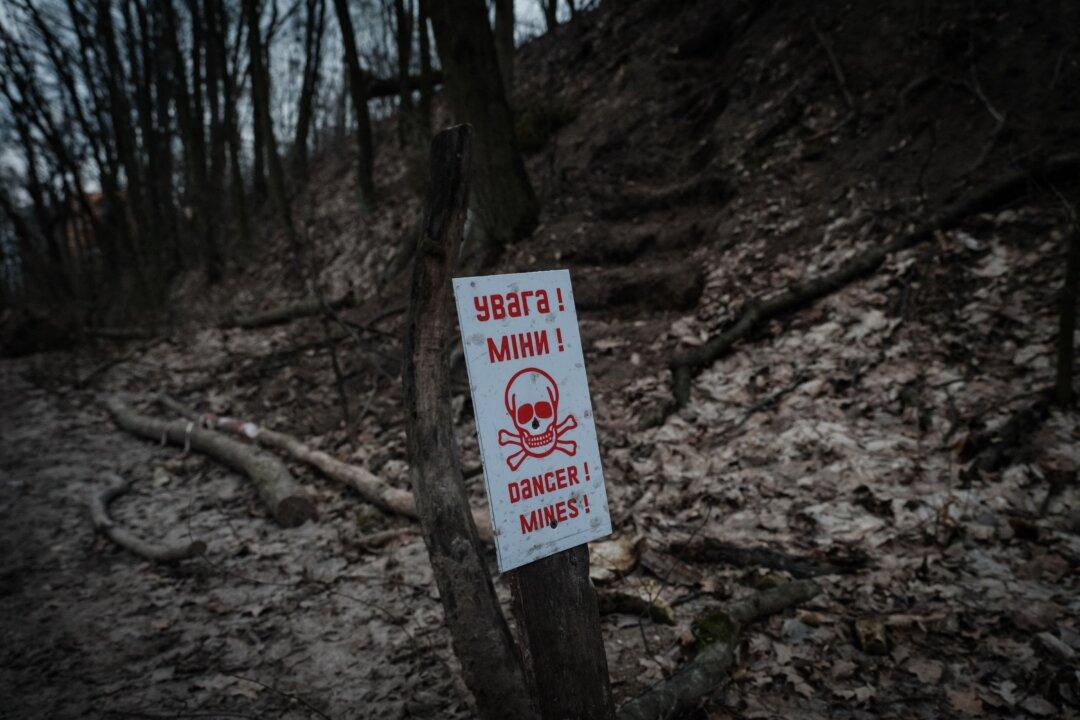Commentary
People in conflict zones have been using mines since the U.S. Civil War—but, what’s going on in Ukraine today is unique in history.
For one, it’s happening at a larger scale than we’ve seen since World War II. Ukraine has the second-largest area of all European countries, and already large parts of it have been contaminated with mines and other explosives.
According to Valon Kumnova, chief of mine action programs at the Geneva International Centre for Humanitarian Demining (GICHD), the intensity of combat means there’s more unexploded ordnance than we’ve seen in other recent conflicts. In addition, the Russian forces are planting mines in urban and agricultural areas, and even in sea lanes. Never before have all three of these key forms of terrain been so extensively mined at once.
This is why it’s more important than ever that the Western world add to Ukraine’s defense and provide financial support for a major investment in mine-clearing operations. The harm done by Russia’s mining operations in Ukraine not only takes a physical and emotional toll on the nation’s citizens, but also stretches well beyond its borders. The mining of farms and the sea lanes that Ukraine depends on for food production and transport undermines the nation’s economic viability and contributes to increased food insecurity worldwide.
Kumnova has over 20 years of experience clearing mines and understands the enduring impact of these landmines in Ukraine. They will remain a lethal hazard for years, decades even, after the war ends. For instance, he helped in the demining effort in Georgia after Russia’s 2008 invasion.
Although the invasion of Georgia only lasted five days, 192,000 people were displaced and landmines were scattered throughout the territory. According to Kumnova, “It took two years to clear the mines and unexploded ordnance.”
Russia’s invasion of Ukraine is Europe’s worst war since World War II, has lasted a year, is high intensity, and takes place over a much greater expanse of land. Therefore, one can only imagine how long the demining effort will take.
The longer the conflict continues, the greater the civilian suffering in the years and decades to come, but this doesn’t mean that mine-clearing can’t start immediately.
Speaking from experience, Kumnova emphasizes the importance of a coordinated approach involving best practices, starting with legal standards that help the government create a strong framework for its mine-clearing effort. This includes a holistic plan for what to clear first and in what order and coordination among the various mine-clearing organizations coming from governments, humanitarian groups, and volunteers. They must also establish a system to ensure all safety standards are being met and information is being managed consistently and with the right tools.
Those on the ground know this, but for those trying to organize aid from thousands of miles away, it’s especially important to think through the logistics. When the stakes are this high, eliminating redundancies and proactively communicating is critically important to ensuring that funding and resources arrive on time and where most needed.
Kumnova has a personal reason for caring that the work is done right.
“I was born in Kosovo,” he explains, “and I’ve seen firsthand the suffering that landmines present. As a refugee myself, I understand that the last thing one wants in that situation is to know you’re coming back to your home, but your home no longer has a roof, the farmland is mined so you can’t grow food, and there’s no way to earn a living. It’s devastating. I want to do even a small part to help.”
But one need not have been a refugee or Ukrainian citizen to recognize the importance of this work and want to make a difference. It’s up to the world to help mitigate the devastation in Ukraine, and it’s essential that we get it right from the start.


